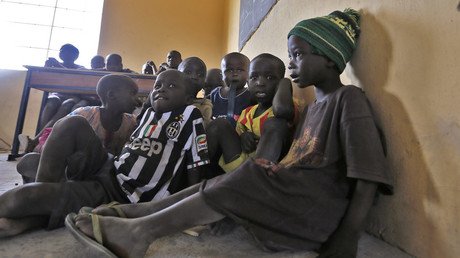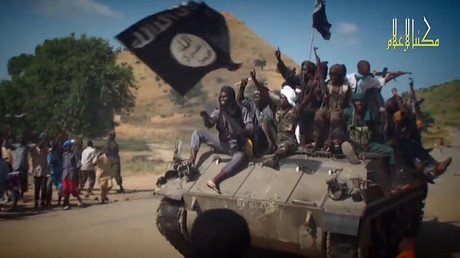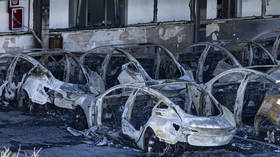Over 80 killed, children burnt to death in Boko Haram attack in Nigeria
Boko Haram militants killed 86 people, including children, in their recent attack on villages in northeastern Nigeria on Saturday. Horrifying details of the attacks emerged on Sunday.
The Saturday night assault on the outskirts of the Nigerian city of Maiduguri – the birthplace of Boko Haram – lasted for hours, targeting villages and camps housing some 25,000 refugees, AP has reported, citing survivors and soldiers at the scene. By Sunday afternoon, 86 bodies had collected, officials said, adding that another 62 victims were being treated for burns.
The Islamic extremists launched the attack on the village of Dalori, where scores of charred corpses and bodies with bullet wounds could be seen lying in the streets, AP reported. “During the incident, lives were lost while some people sustained injuries,” army spokesman Colonel Mustapha Anka confirmed, according to AFP.
Citing an eyewitness surviving the attack, AP reported that Boko Haram extremists firebombed huts. The survivor said that he had heard the screams of children burning to death from a hiding place in a tree.
The shooting and burning attack was carried out by three suicide bombers and continued for nearly four hours, eyewitness who lost several family members told AP.
After scores of villagers had been murdered in Dalori, Boko Haram attackers targeted the neighboring village of Gamori, where three female suicide bombers blew themselves up among people who had managed to escape the first wave of violence, a soldier at the scene told AP.
Survivors complained that it had taken too long for military help to arrive at the scene of the massacre from nearby Maiduguri, AP reported. The first troops to arrive in Dalori were unable to overcome the attackers, as the terrorists were better armed, soldiers told AP on condition of anonymity. The extremist aggressors retreated only after reinforcements with heavier weapons arrived.
The attack came just a day after Boko Haram carried out a twin bombing that claimed the lives of 15 people in Adamawa state, which is also in the northeast of Nigeria.
The Boko Haram terrorist group, whose name is literally translated “Western education is forbidden,” is believed to be even more deadly than Islamic State (IS, formerly ISIS/ISIL). Its extremists in Africa are said to have killed more people that IS, to which they pledged allegiance in 2015.
READ MORE: ‘Deadliest terror group in the world’: The West’s latest gift to Africa
“There is a real bias against media coverage of terrorist attacks in Africa, and especially in Nigeria,” Max Abrahms, assistant professor of political science at Northeastern University in Boston, told RT. “I think many people would be surprised to know how much killing power the main terrorist group Boko Haram has,” he said, adding that if such attacks were carried out against people in European or North American countries, “there would be much more media coverage.”
READ MORE: Nigeria ex-pres used $2bn meant to fight Boko Haram for failed re-election bid – minister
About 20,000 people have been killed and 2.5 million driven from their homes since the Nigeria-based terror group launched a military campaign in 2009, with the goal of establishing Islamist rule. The military managed to drive most of the extremists out of the towns and villages of northeastern Nigeria last year, and since then Boko Haram has been attacking soft targets, increasingly with suicide bombers.
“It’s still mostly a local operation, although, over social media in particular, Boko Haram likes to pretend as if it’s a very international group, highly connected to Islamic State,” Abrahms told RT.
“But the truth is that different affiliates have stronger or weaker relations with IS central, [and] the Boko Haram affiliation is relatively detached, unlike the one in Libya, which is actually directed by the IS leadership in Syria,” he said.















